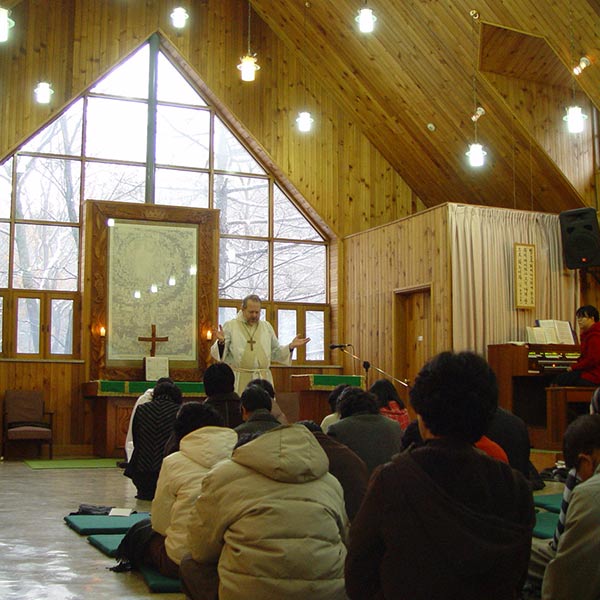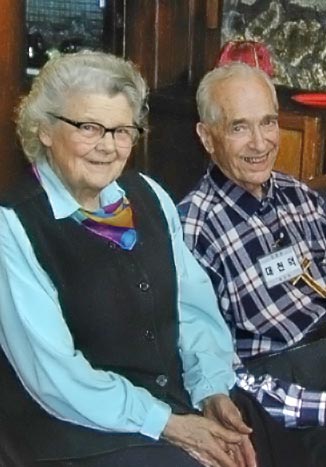Subtotal: $
Checkout-

Lessons from a Village Cow
-

Waging Peace in the Culture Wars
-

Insights on Peacemaking
-

Forgiveness Is Not Fair
-

The First Need of the Church
-

Poem: Errand
-

The Children of War
-

Mikalojus Konstantinas Čiurlionis: The Hymn
-

What Gandhi Taught Me about Jesus
-

The Future of Christian Nonviolence
-

Nonviolence: An Impossible Ideal?
-

Is Pacifism Enough?
-

Disruptive Peacemaking: Living Out God’s Impossible Standard
-

Poems: Damascus Plumbed, Fiddlesticks
-

The Blessings of Conflict
-

From Small Seeds, Great Things Grow
-

The Legend of Heliopher
-

The Face of Nonviolence in a Violent Century: A Review Essay
-

Editors’ Picks Issue 5
-

Everyone Belongs to God
-

Badshah Khan
-

Readers Respond: Issue 5
-

Crossing a New Rubicon
-

Family and Friends: Issue 5
-

Featured Books Summer 2015

Jesus Abbey
Reconciling a Divided Korea: An Interview with Ben Torrey
By Chungyon Won
June 3, 2015
Available languages: 한국어
Next Article:
Explore Other Articles:
The summer of 2000 was exceptionally hot and humid in Korea, and I was sweating as I climbed the steep mountain path to Jesus Abbey, a Christian community founded in 1965 by the American missionaries Archer and Jane Torrey near the northeastern city of Taebaek. My recent graduation from university, which should have been a triumph, had left a sour taste in my mouth. At twenty-six, I was sick of the competition and academic pressure that squeezed any joy out of learning. And the student protests in which I’d enthusiastically joined proved just as unsatisfying – once the demonstrations were over, my circle of friends in the movement drifted apart for lack of a common purpose. My conscience was burdened, and I was thirsting to find peace.
When a friend told me about a community on the mountain where life was shared in Christian comradeship, I hurried to see for myself. Rounding a bend in the trail, I saw sturdy-looking traditional houses built against a rocky slope. People came out to meet me, and it was as if peace was reaching toward me through their welcoming faces. I was a stranger, yet I sensed that in this place I could voice my questions, my fears, my hopes. In the days that followed, encircled by the grandeur and silence of the mountains, I began to experience a change of life. Fifteen years later, I’m still grateful.
This year at Pentecost, Jesus Abbey will be celebrating its fifty-year jubilee. On behalf of Plough I have used this occasion to interview Ben Torrey, Jane and Archer’s son, who has served Jesus Abbey with his wife Liz since 2005.
Already a subscriber? Sign in
Try 3 months of unlimited access. Start your FREE TRIAL today. Cancel anytime.

An Interview with Ben Torrey, by Won Maroo, April 21, 2015
When your father founded Jesus Abbey fifty years ago, he said he wanted it to be “a laboratory of Christian life.” What did he mean?
Actually he wanted it to be three laboratories. The first lab has to do with our individual relationship with God, focusing on prayer: do we trust God to guide us and provide for our needs? The second lab concerns our relationship to one another in Christ: are we able to live together in love? The third lab addresses the relationship of the Christian community with the world: Are we concerned with society’s problems? Are we the hands and feet of Jesus in the world, expressing his love in practical ways?
Let’s talk about the second lab – relationships in community. What does that look like at Jesus Abbey?
Koinonia, or unity, is a gift of the Holy Spirit. Recently we have been thinking that we need to love more – we are aware how far short we fall. The most important thing is to keep praying that the Holy Spirit works among us to soften hearts.
We have tried to develop a culture that makes it easy to ask forgiveness. When someone apologizes, we respond by saying, “Shalom,” meaning, “You are forgiven.” Every now and then, people do this if they’ve made a mistake that impacts others. For example, when I gave a lecture last week, the sister who had prepared the slides botched the job because she was in a rush. At the end of the lecture, she stood up and apologized. There was a spontaneous response of “Shalom.”
We take Jesus’ words seriously that “when you are offering your gift at the altar, if you remember that your brother or sister has something against you, leave your gift there before the altar and go; first be reconciled to your brother or sister, and then come and offer your gift” (Matt. 5:23–24). If there is a problem between two people, they are encouraged to seek forgiveness directly and be reconciled before coming to communion. Every Sunday during the celebration of the Eucharist we have a time of public confession and reconciliation. We wait in silence for a few minutes to give opportunity for people to confess sins that may be troubling them. Nobody is forced to do this. When someone is moved to do so, we all respond with “Shalom.” Last Sunday two of our teenagers publicly asked for forgiveness.
Is it possible for the same kind of reconciliation to take place on a broader scale – for instance, between South and North Korea?
Yes, as we’ve seen on a small scale here. Three Seas Ranch is the name of a property that Jesus Abbey has been leasing since 1975 to raise livestock. Its name stems from the fact that it is located where Korea’s three watersheds meet; rain falling here may find its way into the Han River flowing west, the Fifty Creeks flowing into the East Sea, or the Nakdong River flowing south.
One of my parents’ friends pointed out that there should be a fourth river flowing from this place: the River of Life streaming into North Korea. So the Fourth River Project came into being. Its purpose is to equip South Koreans to share Jesus’ living water with our brothers and sisters in the North. We believe doors will open someday. When that great moment comes, the love of Christ must be brought in humility to our brothers and sisters in the North, in a way they will understand.
You’ve started this mission right at Jesus Abbey’s Three Seas Ranch by bringing North Korean defectors together with South Koreans. What happens when the two groups spend time together?
We have held these labor schools for the last eight summers. Through these conferences, our young people develop ongoing friendships and learn to trust one another. The North Koreans share their perspectives, which is important for them, because they usually try to just fit into society and deny their roots, knowing that most people in the South don’t want to hear about it.
We spend mornings doing physical work – cutting trees, clearing pastureland, or cleaning the barns. Often the North Korean defectors are the ones who demonstrate how to work. One year as we felled trees with hand saws, a twenty-three-year-old woman from the North was sawing expertly, working her way rapidly up the hill; she had been doing this type of work since she was fourteen. It was affirming for her that her skill was appreciated here in South Korea. She became a role model in the labor school.
You’ve visited North Korea to help distribute humanitarian aid. What is it like?
I met many good people and saw much beauty while traveling through North Korea. I also saw a society trapped in great deception. I felt like I was operating inside a vast cult much of the time. I realized that people in the North have as little understanding of the vast gulf as those in the South. One of my colleagues praised my concern about preparing for reunification, but said my efforts were unnecessary: “We speak the same language. We are one culture. We will unite without difficulty.” That is an assumption I’ve seen in both the North and South. Unfortunately, it is far from the truth.
What special challenges do you see in bringing the gospel to the North?
We need to develop a spirit of community and of cooperation. That means coming alongside North Koreans as brothers and sisters rather than as “experts” bringing something that we have and that they need. We must go in deep humility and understand that this is a cross-cultural work – a task that will require much preparation.
Yet beyond these challenges, the greatest need is for unity within the church. If the present church, with all its competition and corruption, goes into the North, I fear people will be prevented from meeting Jesus Christ. And the materialism of South Korea could be devastating to the North.
If the church’s division is such an obstacle, how can it be overcome?
To seek true unity with God and with our brothers and sisters, we need to be humble, forgive others, and love each other. Then God will work among us. Only the Holy Spirit can bring repentance, forgiveness, healing, and true unity. If we experience the baptism of the Holy Spirit, we will be empowered for the task Christ asks of us – and that includes serving the people of North Korea and preparing for the reunification of Korea. I believe that this can happen, through the work of the Holy Spirit poured out upon this nation.

Already a subscriber? Sign in
Try 3 months of unlimited access. Start your FREE TRIAL today. Cancel anytime.

The Founders: Archer and Jane Torrey
Archer Torrey was born in China in 1918 to missionary parents. After working as a commercial sailor during World War II (he was a conscientious objector), in 1957 he was invited to Seoul to revive an Anglican seminary. Soon Archer and his wife Jane were dreaming of a place in South Korea where people could find Jesus and experience God’s justice. So in 1965, with their son Ben and a few volunteers, they moved to the Taebaek Mountains to start building what became Jesus Abbey.
A stream of people soon poured through the community, and hasn’t stopped since. Some join as members, but most stay for shorter periods of communal work and worship. The Torreys tirelessly served these guests until Archer’s death in 2002 and Jane’s ten years later. About seventy people, including children, live at Jesus Abbey now, and about five thousand visit yearly. Anyone wishing to participate in Jesus Abbey’s Jubilee celebration in North America can join the weekend at Montrose Bible Conference (Pennsylvania), September 25–27, 2015. Find out about the Jesus Abbey’s reconciliation work at www.thefourthriver.org.
Photographs courtesy of the Jesus Abbey
 Archer and Jane Torrey
Archer and Jane Torrey
Already a subscriber? Sign in
Try 3 months of unlimited access. Start your FREE TRIAL today. Cancel anytime.



































Carolee A Uits
When I am no longer able to function well in rough places such as here in Tanzania with not always even basic amenities, I yearn for a community of reconciliation and Christian koinonia. Can Bruderhof be such a place for such an "outsider"? What other Christian communities might be available - especially where English is spoken? My background is in seeking reconciliation for human rights, and in walking with God as a Christian.